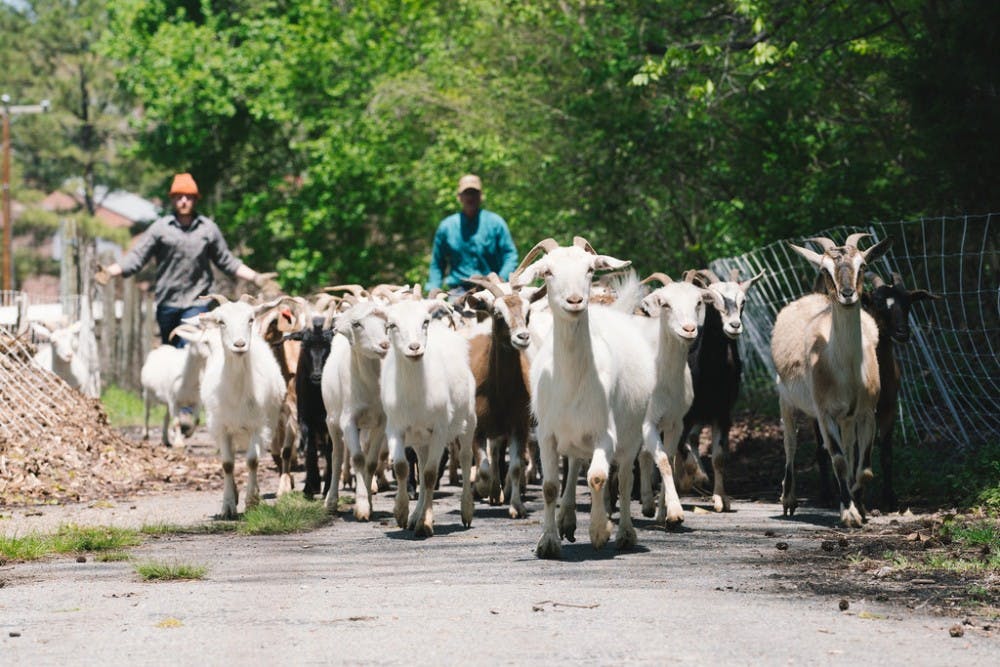The Eco-Corridor will open in spring 2020 to provide students with many amenities and opportunities – not just the goats.
The Eco-Corridor will contain two outdoor classrooms, one of which has already been completed, said Todd Lookingbill, an associate professor of geography and the environment.
Outdoor classrooms are not the only spaces for students within the Eco-Corridor. There will also be reflection spots, and there may even be competitions held to see who can design the best reflection space, Lookingbill said.
Students will also be able to enjoy access to Little Westham Creek, because there will be paths down to the water from the Eco-Corridor trail, Director of Sustainability Rob Andrejewski said.
Near the Physical Plant, there will be boulders that have come from other construction sites on campus for students to sit on, Andrejewski said.
“Students, once it’s open, can just hang out there by the stream and it will be really easy to access,” Andrejewski said.
The stream restoration is nearly complete and the trail will be finished in six to eight weeks, Andrejewski said. The trail will be open before the grand opening of the Eco-Corridor, which will be held in the spring in honor of the 50th anniversary of Earth Day.
The trail itself will be a great amenity, because it will form two paths for students and residents of the surrounding neighborhoods to use, Lookingbill said.
One path will lead to a crosswalk across River Road to the River Road Shopping Center, which can then connect pedestrians to the Huguenot Bridge and eventually to Pony Pasture.
Lookingbill referred to the second path as the “campus loop.” A sidewalk along River Road will lead into the campus’s entrance and connect to the Eco-Corridor’s path, Lookingbill said. This path could also be a big figure-eight if someone were to go along both the campus loop from River Road and the path around the lake.
To Andrejewski, these amenities come second to what the Eco-Corridor holds in store for the future of student research.
“This opportunity to provide a living laboratory for learning is really the most exciting part,” Andrejewski said.
Enjoy what you're reading?
Signup for our newsletter
Lookingbill agreed, saying the newly accessible land will allow students to conduct not only scientific research in the area, but also historical and cultural studies.
In the Eco-Corridor area, dams, old railroad lines, railroad ties and tons of coal have been discovered, Lookingbill said. These historical and cultural features will create opportunities for students from various disciplines to investigate and discover more about the campus and its history.
Patrick Benner, director of residence life and undergraduate student housing, said that alongside the benefits of having new green space and reflective spots, the Eco-Corridor also opens up new opportunities for connecting residential life with curricular and co-curricular programs.
“With classes like the Earth Lodge, would there be other learning communities that would want to come together and then potentially have class out there but also live together in proximity to that space?” Benner said. “I think it has a lot of good things to come.”
Along with all the amenities to students, the Eco-Corridor also supports many environmental benefits and initiatives.
The construction for the stream restoration of the Eco-Corridor required that certain plants and trees be taken down, Andrejewski said. However, once construction is completed, there will be 9,000 trees planted to account for those taken down.
Even more, plant species that are native to the area will be planted in an attempt to attract pollinators and provide more attractive habitats to birds and other animals, Andrejewski said.
Contact news writer Cate Bonner at cate.bonner@richmond.edu.
Support independent student media
You can make a tax-deductible donation by clicking the button below, which takes you to our secure PayPal account. The page is set up to receive contributions in whatever amount you designate. We look forward to using the money we raise to further our mission of providing honest and accurate information to students, faculty, staff, alumni and others in the general public.
Donate Now



